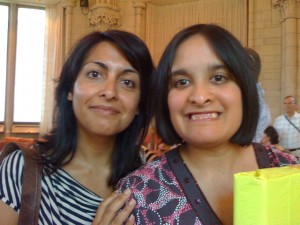
Alex Scott, a 20-year-old psychology undergraduate at Surrey University, is spending a year with youth volunteering programme City Year London. The project, launched in September, involves 18-25-year-olds spending time in London primary schools, mentoring and supporting those younger than themselves. It is based on a successful American model of civic duty that began in 1988.
I’m sure everyone is weary of hearing how they can make a difference. We may tire of saying that you’ve changed the world by holding the door open for the person behind you or by bundling loose change into the upturned hat of a homeless person. True, being generally polite and selfless to one another is an honourable feat, but I’m writing about an organisation that requires a little, no, a lot more, commitment.
I’m a team leader for an organisation called City Year, which has emigrated from the USA after establishing itself in 20 other locations before reaching London, England, and it aims to have the same success that it has achieved across the Atlantic.
This year, City Year London has called together a diverse team of over 60 young people to volunteer a year of service with the agenda of making a real difference to the communities it reaches.
Primary schools in Hackney, Islington and Tower Hamlets were signed up to receive a group of 18–25 year old full-time volunteers in their school to act as role models and mentors in the key stage two (seven to 11 year olds) classes. As Team Leader for the Towerbrook team based in Sebright Primary School in Hackney, I lead a group of nine volunteers who are there from when the first child arrives in the morning, to when the last child leaves when school ends. The team take part in after school clubs, breakfast clubs, spend time in the playground and lunch hall every day and are a constant presence in the classrooms; often targeting children that teachers identify as needing extra support that may have not always been able to receive.
But as amazing as this may sound, the volunteers that City Year accepts through a strict interviewing process aren’t superheroes, no matter how they may look in their uniform red jackets and Timberland boots. Full time volunteering isn’t easy; and City Year asks a lot of its ‘corps members’. Expenses are offered for up to £100 per week and there is the opportunity to receive a Citizens Service Award of up to £1000 upon graduating the year of service, but that £100 can only get you so far and the early starts and late finishes definitely adds a few premature wrinkles. So why do it?
I heard about City Year through an advertisement on a placement website, having searched for year long placements in London with the aim of taking a year out of my University studies to work in a professional setting. I was offered the role of Team Leader, and although I approached it with trepidation, I have been able to see the developments that my team have made first hand. Sebright Primary School has welcomed us with patient and trusting arms, allowing us to take real responsibility over our effect in the school.
First thing in the morning, the volunteers run exercise routines known as physical training with the children in an attempt to combat lateness. During the school day, each volunteer has been assigned the task of daily supported reading for Key Stage One children, and a select few have the responsibility of improving the phonic skills of students who require that extra bit of guidance so that they don’t get left behind. The volunteers have taken on the task of an after school club as well, a sort of ‘citizenship’ session where the children who attend are taught skills and acquire knowledge that will help them both in and outside the school setting.
What has impressed me the most, however, is how well integrated the volunteers now are with the children at the school. It doesn’t seem to matter how early they have to wake up or how late they get to leave, each volunteer will always have a swarm of children around them at playtimes, and will never be too tired to join them in a game or listen to their stories for the week. I will only be in my position as team leader for a year, then I will return to university, but I have high expectations for all that City Year hopes to achieve based on how my team have performed thus far.
My time so far with City Year has made me a more confident and self assured person, but more importantly, it has taken a chip from my cynicism and shown me that through spirit, discipline, purpose and pride, anyone can hope to make a difference to the world around them.






